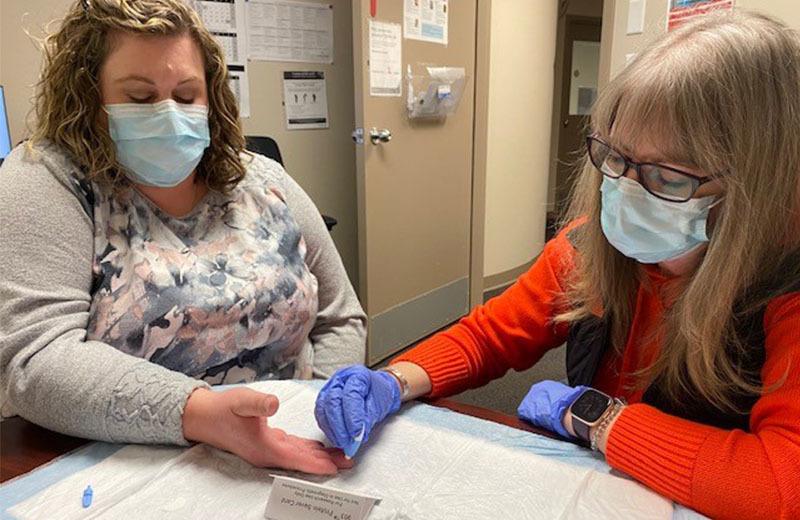Screening for sexually transmitted and blood-borne infections (STBBIs) is key to successful diagnosis and treatment. However, there can be barriers that prevent people from being screened. For example, some people are afraid of having their blood drawn. Dried blood spot testing (DBST) is a simpler way to check for diseases like HIV, hepatitis C, and syphilis without using traditional needle-based blood tests.
What is DBST?
CATIE, Canada’s source for HIV and hepatitis C information, says DBST is when “a sample of blood droplets is collected on a filter paper and then dried for transportation to a laboratory.” It requires only a finger prick – much easier for many people than having their blood drawn -- and because the blood is dried, there’s less need for special precautions when storing or transporting the sample.
Advantages of DBST
- People other than health care providers can collect the sample.
- Samples can be collected outside healthcare settings.
- DBST is less invasive for patients than having vials of blood drawn.
- Samples do not need to be shipped to the lab for testing as dangerous goods.
- If enough sample is collected to perform RNA testing, HIV and hepatitis C results are considered 100% accurate.
- Results are communicated through the same channels as results from traditional STBBI testing.
Disadvantages of DBST
- Not as sensitive as traditional blood tests (they remain the gold standard).
- Clients with positive syphilis results will still need confirmation from a traditional blood test.
- The time between transmission and when a test can reliably detect the infection is longer when compared to traditional blood tests.
The use of DBST for infectious diseases is not yet licensed by Health Canada, but is validated by the National Laboratory for HIV Reference Services. Northern Health’s Regional Chronic Diseases Program, in collaboration with the BC Centre for Disease Control and Canada’s National Microbiology Laboratory, developed the processes to facilitate DBST in the North.
In December 2021, DBST was introduced on a small scale in the Northern Interior and has shown promising results. Responses from clients regarding DBST are largely positive: in our evaluation, 92% of those tested reported being "very satisfied” or ”satisfied” with DBST.
For example, one client said, “Good that it was easily accessible. Testing is done in a positive environment and the people who poke you are nice.”
Those who have provided DBST (i.e., collected samples) also report that it's a great addition to the STBBI testing toolkit.
“The DBS test is very useful for a number of reasons,” said one Northern Health care provider. “One, it's just a finger poke to test for multiple STIs on one card, which is great to be able to offer, and the fact you can throw it in the mail...”
For more information on HIV and the services available from Northern Health visit our website.














Comments